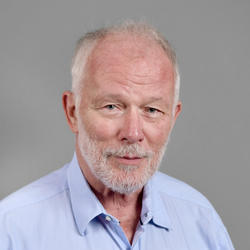2018.09.1715:00-16:30
フューチャー・デザイン研究所講演会のご案内
9月17日(月・祝日)にフューチャー・デザイン研究所では、持続可能性科学で長年世界をリードしているアリゾナ州立大学 Sander van der Leeuw教授をお招きし、講演会を開催します。
事後ではなく、事前アプローチとして適応的な手法を提案されており、私たちが将来をデザインするための新たな科学のあり方についてご講演いただきます。
研究者の方々のみでなく、一般の皆様に聴講いただけます。
申込み不要、参加費無料、詳細は下記をご覧ください。
(使用言語は英語)
フューチャー・デザイン研究所 講演会
日時
平成30年9月17日(月・祝日) 15:00~16:30
場所
高知工科大学 永国寺キャンパス 教育研究棟 A201
※お車でお越しの場合は周辺の有料駐車場等をご利用ください。できる限り公共交通機関をご利用くださいますようご協力をお願いいたします。
講演タイトル The Present between Past and Future
過去と未来の間の現在 (使用言語は英語)
講演者 プロフィール
 Sander van der Leeuw教授
Sander van der Leeuw教授
An archeologist and historian Prof. Sander van der Leeuw has been specializing in the long-term interactions between humans and their environments. Pioneer in the application of the Complex Adaptive Systems (CAS) approach to socio-environmental challenges, technology and innovation. Coordinator of the ARCHAEOMEDES interdisciplinary research program (1991-2000) using the CAS perspective on socio-natural interactions and environmental problems in S. Europe - the first of its kind. Co-director of the ISCOM project on invention and innovation from a CAS perspective (2003-2007). Founding director of Arizona State University's School of Human Evolution and Social Change (2003-2011) and Dean of its School of Sustainability (2010-2013). Now he is co-director of the ASU-SFI Center for Biosocial Complex Systems. He is also an External Professor of the Santa Fe Institute, a Corresponding Member of the Royal Dutch Academy of Arts and Sciences, and he held a Chair at the Institut Universitaire de France (2003-2008). In 2012, he was awarded the title "Champion of the Earth for Science and Innovation" by the United Nations Environment Program.
考古学者であり歴史学者でもある Leeuw教授は、考古学者、歴史学者でもあり、人間とその環境についての長期的な相互作用がご専門で複雑適応系システム(CAS)の社会的環境課題、技術、革新へのアプローチのパイオニア。
学際的研究プログラムARCHAEOMEDESのコーディネーターとして、CASの視点から、南ヨーロッパの社会自然的相互作用と環境問題に取り組む。(1991-2000) ISCOMプロジェクトでは発明とイノベーションに関する共同ディレクターを務めた。(2003〜2007) 米国 アリゾナ州立大学のHuman Evolution and Social Changeの創立理事(2003-2011)、サステイナビリティ学部の学部長(2010-2013)を経て、現在はアリゾナ州立大学 ASU-SFI Biosocial Complex Systemsセンターの共同ディレクターを務める。
講演 要旨
Western science has not really developed thinking about the future, but mainly about the relationship between present and past. The reasons for that date back to the 17th century in Western Europe. They are not so much theoretical or philosophical, as they are practical, due to the career structure of scientists. A side effect of that approach has been the reductionist nature of much western science. But ion the present situation, because change in our world has accelerated hugely, this is no longer enough. We must focus on the future, and need to develop the techniques and tools to do so, notwithstanding some quite difficult challenges. First, we need to shift our attention from looking at the origins of the present to looking at the emergence of the present. That requires adopting an ex-ante approach, and in practice the most likely candidate is the Complex (Adaptive) Systems approach, which involves a number of major changes in our scientific practice, moving from an approach that aims to gain clarity by reducing the number of dimensions involved in acquiring knowledge to explain phenomena, to one that increases the dimensionality of our conception of phenomena to attain understanding. I will end the talk by pointing to some of the ways we can promote integrating thinking about the future in our scientific work.
西洋の科学は、未来を考えるのではなく、主に現在と過去の関係について考えてきました。その理由は、西ヨーロッパでは17世紀にさかのぼります。理論的または哲学的な理由によるというよりも、職業としての科学者の実践的な理由によるものです。このアプローチの副作用は、西洋科学の還元主義的性質です。ところが、現在の状況では、世界の変化が大きく加速しているため、このやり方では不十分です。かなり 困難な課題であるのにもかかわらず、私たちは、未来に焦点を当て、そのための技術やツールを開発する必要があり ます。まず、現代の起源を見ることから、なぜ今のような状況になったのか検討することにシフトせねばなりません。そのためには、(事後ではなく)事前アプローチを採用する必要があります。具体的にいうと、その最も可能性の高い候補は複雑な(適応的な)システムアプローチです。科学的な実践を行うにあたって、さまざまな現象を説明するのに必要な知識を得るために、ものごとを説明する次元の数を減らすことで明晰さを得るというアプローチから、それらを理解するために 概念化の次元を増やすアプローチに変化せねばなりません。最後に、科学的な研究において未来の考察の仕方を統合する幾つかの手法を指摘するつもりです。
- このページに関するお問合せは下記までお寄せください。
-
高知工科大学フューチャー・デザイン研究所
-
住所
高知市永国寺町2-22
-
Tel.
088-821-7145
-
Mail.
minami.sachiko@kochi-tech.ac.jp
-
